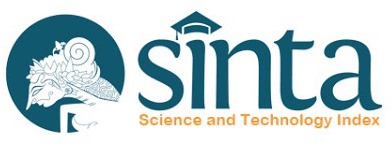Human Health Risk Assessment of Heavy Metals Bioaccumulation In Fish and Mussels from Jakarta Bay
Abstract
Aquatic environment of Jakarta Bay have already been highlighted due to its heavy metals contamination which may lead into food safety concern of fisheries products derived from this region. This research aimed to investigate bioaccumulation level of heavy metals (Pb, Cd, and As) in fish and mussels from Jakarta Bay, as a human risk assessment of seafood consumption. Samples of mussels and fish were taken from Penjaringan, Tarumanegara, Cilincing, and Tanjung Pasir district. Bioaccumulation of heavy metals was analyzed by Inductively Coupled Plasma -Mass Spectrometry technique. Results of the study revealed that metals bioaccumulation in fisheries products were varied, with As (Arsenic) as the highest metal contaminant (0.68 mg/kg, dry weight). Furthermore, estimated daily intake (EDI), target hazard quotient (THQ), total target hazard quotient (TTHQ), and safety limits prescribed by various agencies, showed that consumption of fisheries products from Jakarta Bay considered as relatively safe for human health in total of food ingestion rate of fish 57.34 g/day. These results are expected to serve as a baseline to construct preventive and palliative policies for food safety of fisheries products from Jakarta Bay.
Keywords
Full Text:
pdfReferences
Agusa, T., Kunito, T., Sudaryanto, A., Monirith, I., Kan-Atireklap, S., Iwata, H., … Tanabe, S. (2007). Exposure assessment for trace elements from consumption of marine fish in Southeast Asia. Environmental Pollution, 145(3), 766–777. http://doi.org/10.1016/j.envpol.2006.04.034
Alexander, J., Benford, D., Cockburn, A., Cravedi, J.-P., Dogliotti, E., Di Domenico, A., … Verger, P. (2009). SCIENTIFIC OPINION Cadmium in food Scientific Opinion of the Panel on Contaminants in the Food Chain. The EFSA Journal, 980, 1–139. http://doi.org/doi:10.2903/j.efsa.2009.980
Anonymous. (2015). Harga Ikan Stabil, Cumi dan Kembung Malah Turun Rp 10.000/Kg. Retrieved March 1, 2017, from https://finance.detik.com/berita-ekonomi-bisnis/2867951/harga-ikan-stabil-cumi-dan-kembung-malah-turun-rp-10000kg
Anonymous. (2016). Konsumsi Ikan Naik dalam 5 Tahun Terakhir. Retrieved March 1, 2017, from news.kkp.go.id/index.php/konsumsi-ikan-naik-dalam-5-tahun-terakhir/
Arfin, Z., Puspitasari, R., & Miyazaki, N. (2012). Heavy metal contamination in Indonesian coastal marine ecosystems : A historical perspective. Coastal Marine Science, 35(1), 227–233.
Arulkumar, A., Paramasivam, S., & Rajaram, R. (2017). Toxic heavy metals in commercially important food fishes collected from Palk Bay, Southeastern India. Marine Pollution Bulletin, 119(1), 454–459. http://doi.org/10.1016/j.marpolbul.2017.03.045
Badan, S. N. I. (2009). Batas maksimum cemaran logam berat dalam pangan. Badan Standardisasi Indonesia, 17.
Badan Pusat Statistik. (2015). Angka Harapan Hidup Penduduk Beberapa Negara (tahun), 1995-2015. Retrieved March 1, 2017, from https:www.bps.go.id/linkTabelStatis/view/id/1517
Badan Pusat Statistik. (2017). Survey Sosial Ekonomi Nasional (Susenas). Retrieved March 1, 2017, from https://www.bps.go.id/LinkTabelStatis/view/id/950.
Barone, G., Storelli, A., Garofalo, R., Busco, V. Pietro, Quaglia, N. C., Centrone, G., & Storelli, M. M. (2015). Assessment of mercury and cadmium via seafood consumption in Italy: estimated dietary intake (EWI) and target hazard quotient (THQ). Food Additives & Contaminants. Part A, Chemistry, Analysis, Control, Exposure & Risk Assessment, 32(8), 1277–86. http://doi.org/10.1080/19440049.2015.1055594
Bastami, K. D., Afkhami, M., Mohammadizadeh, M., Ehsanpour, M., Chambari, S., Aghaei, S., … Baniamam, M. (2015). Bioaccumulation and ecological risk assessment of heavy metals in the sediments and mullet Liza klunzingeri in the northern part of the persian gulf. Marine Pollution Bulletin, 94(1–2), 329–334. http://doi.org/10.1016/j.marpolbul.2015.01.019
Berghof. (2000). Theory of Sample Preparation Using Acid Digestion , Pressure Digestion and Microwave Digestion ( Microwave Decomposition ). Zandel Holding Enterprise, 260, 207–209.
Breckwoldt, A., Dsikowitzky, L., Baum, G., Ferse, S. C. A., van der Wulp, S., Kusumanti, I., … Adrianto, L. (2016). A review of stressors, uses and management perspectives for the larger Jakarta Bay Area, Indonesia. Marine Pollution Bulletin, 110(2), 790–794. http://doi.org/10.1016/j.marpolbul.2016.08.040
Cai, L. M., Xu, Z. C., Qi, J. Y., Feng, Z. Z., & Xiang, T. S. (2015). Assessment of exposure to heavy metals and health risks among residents near Tonglushan mine in Hubei, China. Chemosphere, 127, 127–135. http://doi.org/10.1016/j.chemosphere.2015.01.027
Castro-González, M. I., & Méndez-Armenta, M. (2008). Heavy metals: Implications associated to fish consumption. Environmental Toxicology and Pharmacology, 26(3), 263–71. http://doi.org/10.1016/j.etap.2008.06.001
Dsikowitzky, L., Ferse, S., Schwarzbauer, J., Vogt, T. S., & Irianto, H. E. (2016). Impacts of megacities on tropical coastal ecosystems ??? The case of Jakarta, Indonesia. Marine Pollution Bulletin, 110(2), 621–623. http://doi.org/10.1016/j.marpolbul.2015.11.060
El-Moselhy, K. M., Othman, A. I., Abd El-Azem, H., & El-Metwally, M. E. A. (2014). Bioaccumulation of heavy metals in some tissues of fish in the Red Sea, Egypt. Egyptian Journal of Basic and Applied Sciences, 1(2), 97–105. http://doi.org/http://dx.doi.org/10.1016/j.ejbas.2014.06.001
Griboff, J., Wunderlin, D. A., & Monferran, M. V. (2017). Metals, As and Se determination by inductively coupled plasma-mass spectrometry (ICP-MS) in edible fish collected from three eutrophic reservoirs. Their consumption represents a risk for human health? Microchemical Journal, 130, 236–244. http://doi.org/10.1016/j.microc.2016.09.013
Hosono, T., Su, C. C., Delinom, R., Umezawa, Y., Toyota, T., Kaneko, S., & Taniguchi, M. (2011). Decline in heavy metal contamination in marine sediments in Jakarta Bay, Indonesia due to increasing environmental regulations. Estuarine, Coastal and Shelf Science, 92(2), 297–306. http://doi.org/10.1016/j.ecss.2011.01.010
Islam, M. S., Ahmed, M. K., Habibullah-Al-Mamun, M., & Masunaga, S. (2015). Assessment of trace metals in fish species of urban rivers in Bangladesh and health implications. Environmental Toxicology and Pharmacology, 39(1), 347–357. http://doi.org/10.1016/j.etap.2014.12.009
Ladwig, N., Hesse, K. J., van der Wulp, S. A., Damar, A., & Koch, D. (2016). Pressure on oxygen levels of Jakarta Bay. Marine Pollution Bulletin, 110(2), 665–674. http://doi.org/10.1016/j.marpolbul.2016.04.017
Mahimairaja, S., Bolan, N. S., Adriano, D. C., & Robinson, B. (2005). Arsenic Contamination and its Risk Management in Complex Environmental Settings. Advances in Agronomy, 86, 1–82. http://doi.org/10.1016/S0065-2113(05)86001-8
Mozaffarian, D., & Wu, J. H. Y. (2011). Omega-3 fatty acids and cardiovascular disease: Effects on risk factors, molecular pathways, and clinical events. Journal of the American College of Cardiology, 58(20), 2047–2067. http://doi.org/10.1016/j.jacc.2011.06.063
Olmedo, P., Pla, A., Hernández, A. F., Barbier, F., Ayouni, L., & Gil, F. (2013). Determination of toxic elements (mercury, cadmium, lead, tin and arsenic) in fish and shellfish samples. Risk assessment for the consumers. Environment International, 59, 63–72. http://doi.org/10.1016/j.envint.2013.05.005
Pelling, M., & Blackburn, S. (2013). Megacities and the Coast. Megacities and the Coast: Risk, Resilience and Transformation (Vol. 9780203066). http://doi.org/10.4324/9780203066423
Saha, N., Mollah, M. Z. I., Alam, M. F., & Safiur Rahman, M. (2016). Seasonal investigation of heavy metals in marine fishes captured from the Bay of Bengal and the implications for human health risk assessment. Food Control, 70, 110–118. http://doi.org/10.1016/j.foodcont.2016.05.040
Sarmiento, A. M., DelValls, A., Nieto, J. M., Salamanca, M. J., & Caraballo, M. A. (2011). Toxicity and potential risk assessment of a river polluted by acid mine drainage in the Iberian Pyrite Belt (SW Spain). Science of the Total Environment, 409(22), 4763–4771. http://doi.org/10.1016/j.scitotenv.2011.07.043
Sindern, S., Trem??hlen, M., Dsikowitzky, L., Gronen, L., Schwarzbauer, J., Siregar, T. H., … Irianto, H. E. (2016). Heavy metals in river and coast sediments of the Jakarta Bay region (Indonesia) ??? Geogenic versus anthropogenic sources. Marine Pollution Bulletin, 110(2), 624–633. http://doi.org/10.1016/j.marpolbul.2016.06.003
Siregar, T. H., Priyanto, N., Putri, A. K., Rachmawati, N., Triwibowo, R., Dsikowitzky, L., & Schwarzbauer, J. (2016). Spatial distribution and seasonal variation of the trace hazardous element contamination in Jakarta Bay, Indonesia. Marine Pollution Bulletin, 110(2), 634–646. http://doi.org/10.1016/j.marpolbul.2016.05.008
Susiyeti, F. (2010). Analisis Risiko Kesehatan Pencemaran Logam Kadmium pada Ikan di Kampung Nelayan Muara Angke Kelurahan Pluit Kecamatan Penjaringan Jakarta Utara tahun 2010.
US EPA. (1992). Guidelines for Exposure Assessment. Risk Assessment Forum, 57(104), 22888–22938. http://doi.org/EPA/600/Z-92/001
US EPA. (1999). Risk Assessment Guidance for Superfund : Human Health Evaluation Manual Supplement to Part A : Community Involvement in Superfund Risk Assessments Risk Assessment Guidance for Superfund : Evaluation, 1.
US EPA. (2002). A review of the reference dose and reference concentration process, (December), 1–192. http://doi.org/EPA/630/P-02/002F
US EPA. (2016). Risk-based Concentration Table. United States Environmental Protection Agency, Washington, DC.
Velusamy, A., Satheesh Kumar, P., Ram, A., & Chinnadurai, S. (2014). Bioaccumulation of heavy metals in commercially important marine fishes from Mumbai Harbor, India. Marine Pollution Bulletin, 81(1), 218–224. http://doi.org/10.1016/j.marpolbul.2014.01.049
Wibowo, S., Murtini, J. T., Barokah, G. R., & Siregar, T. H. (2015). Kajian Risiko Merkuri pada Ikan dari Teluk Jakarta. Manuscript Submitted for Publication.
Yi, Y., Tang, C., Yi, T., Yang, Z., & Zhang, S. (2017). Health risk assessment of heavy metals in fish and accumulation patterns in food web in the upper Yangtze River, China. Ecotoxicology and Environmental Safety, 145(July), 295–302. http://doi.org/10.1016/j.ecoenv.2017.07.022
DOI: https://doi.org/10.15578/squalen.286
Article Metrics
 pdf Download: 501
pdf Download: 501
Refbacks
- There are currently no refbacks.
ISSN : 2089-5690(print), E-ISSN : 2406-9272(online)
This work is licensed under a Creative Commons Attribution-NonCommercial-ShareAlike 4.0 International License.










